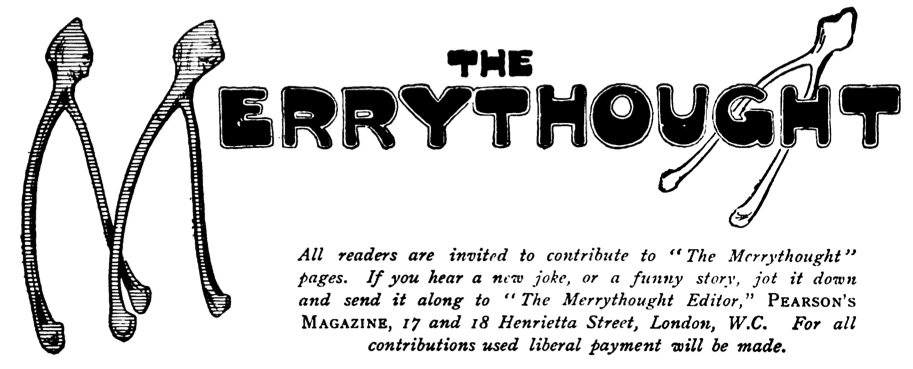Pearson’s Magazine (UK), November 1905
Some anecdotes
The November 1905 page of Wodehouse’s Money Received for Literary Work notes that in the English Pearson’s magazine he published “A New Line” and some anecdotes, receiving £2⋅0⋅6 in all. Until now no attempt had been made to attribute any the items in the “Merrythought” column to Wodehouse, but John Dawson has found the originals of some of them in Norman Murphy’s edition of Wodehouse’s “Phrases and Notes” books, all from the first (A) volume.
First, here are the items as they appeared in the magazine:

A CLEVER DEDUCTION.
He: “Ah, Lady B——, I had the pleasure of meeting you last year. And how is your dear little girl?”
She: “My little boy is quite well, thank you.”
He: “Little boy? Ah, yes, of course. I knew it was one of the two.”
MISUNDERSTOOD.
“Miss Smith has come back from the seaside.”
“Did she get brown?”
“No. Robinson.”
RIDDLES.
Why is a cat like a rose?
They both come out if you put them into water.
What is the difference between a policeman and a fisherman?
One has his beat, the other has his smack.
And here are the items as numbered in Phrases and Notes:
A32. A. Ah, Lady B, I had the pleasure of meeting you last year. And how is your little girl?
Lady B. My little boy is quite well, thank you.
A. Little boy? Ah, yes. I knew it was one of the two.
(Told me by Harold Begbie
(30.6/02
A270. A. Miss X has come back from the seaside.
B. Did she get brown?
A. No. Robinson.
A162a. Why is a cat like a rose-bud? A. Because if you put them in water, they both come out.
A49. The difference between a policeman & a fisherman. The one has his beat, the other his smack.
Notes:
smack, n.3 A single-masted sailing-vessel, fore-and-aft rigged like a sloop or cutter, and usually of light burden, chiefly employed as a coaster or for fishing, and formerly as a tender to a ship of war. [1912 edition of the Oxford English Dictionary]
Harold Begbie: prolific English author and journalist, editor of the “By The Way” column in the Globe newspaper. Wodehouse was a part-time contributor to the column in 1902 when he noted down the first item above as told to him by Begbie. He became Begbie's full-time assistant in 1903 and was placed in charge of the column in 1904; see the Globe Reclamation Project for more.
The rose riddle makes more sense when told of a rose-bud, as in Wodehouse’s original note.
 Madame Eulalie’s Rare Plums
Madame Eulalie’s Rare Plums